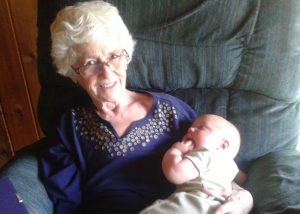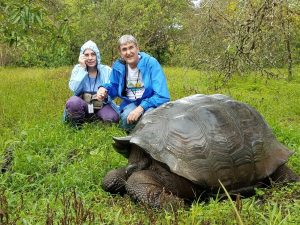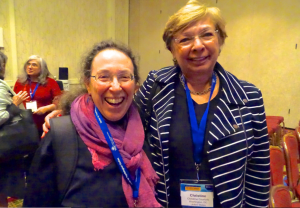Kate McMaugh, Editor, ISSTD News
Members of ISSTD who retire are still able to enjoy connection with colleagues working in the field of trauma and dissociation, through the ISSTD Retired Membership category. The Retired Membership is open to members who have retired from active practice or research. To be eligible for Retired Membership, the member must be at least 65 years of age and have paid dues to the Society for 10 or more years. Retired members have all the benefits of full membership except that they may not run for or hold office. We asked a few of our retired members to tell us a little about what life is like for them now they have retired and what it means for them to maintain a retired membership with ISSTD. Well known ISSTD Fellow, and past chair of the RAMCOA SIG, Alison Miller, shares with us the impact of this lifelong work on her and what it means to be retired to spend more time with her family.

Here is Alison in her “other” identity—”Granny,” with her youngest grandchild.
In retirement Alison, who lives in Canada, has moved from the city to a little mountain village to be close to family and live closer to nature. When asked how it feels to retire Alison says, “At last, I can just be a human being among other human beings. No one expects me to be an expert on life … I like just being a person. I like having the freedom to sometimes be rude, to not have to watch myself as a constant role model for other people…Maybe I’ll be a cranky old lady.” She adds that while working in the field of dissociative disorders, and specifically with survivors of organized abuse (RAMCOA) has been a very fulfilling career, it has also been challenging. “This is an exhausting field. The tortuous complexity of personality systems, the agony of the hurt inner children, the moral injury of forced perpetration, and most of all, with some clients, the constant ongoing torture by perpetrator groups, has taken its toll on me. It’s hard to feel connected to “normal” life when I spend most of my day with people who have suffered so intensely at the hands of other human beings. It’s time to pass the torch onto others, to leave the battlefield to the next wave of soldiers.” “For the past few years I have felt a strong need to be around normal, healthy people, in a natural, healthy environment, with music, trees, and play.” “ISSTD, and in particular the RAMCOA special interest group, are still my people, in a different way from those who know me as “granny.” Our members … are the ones who understand what I’m talking about and what my clients have experienced. I remain part of this group in order to continue to pass on what I’ve learned, and also to connect with my people, those who have taken on the daunting challenge of this work.” ISSTD members are fortunate to benefit from Alison’s wisdom and experience as her retired membership has enabled her to continue to volunteer for ISSTD. She serves on the RAMCOA SIG Executive, she presents at
RAMCOA all day webinars and is currently chairing the RAMCOA Bookclub discussion of her book
Healing the Unimaginable. ISSTD is also privileged to count
Philip Coons, MD, ISSTD Fellow and past president (1988-1989) as one of our retired members. In comments that may make some of us rather green with envy Phil reports,

Retirement opens up travel opportunities. Here is a photo of Phil and his wife, Elizabeth Bowman, MD (also a renowned trauma specialist and past president of ISSTD) watching a giant land tortoise during their latest trip to the Galapagos Islands, Ecuador.
“Retirement is great. In fact, I worked part time for several years before I fully retired. I have many hobbies, including travel, photography, hiking, genealogy, reading, and writing. Yes, I still write. I published four books in partial retirement, but not about dissociation, and I write essays for the
Indianapolis Literary Club. Like Alison, remaining in contact with colleagues and friends is an important attraction of the Retired Membership Category for Phil, “I continue to remain a retired member of the ISSTD to keep in contact with my colleagues. I also attend monthly luncheons with my retired colleagues from work, and I attend Neurology and Psychiatry Department Grand Rounds on a regular basis. In late summer I plan to take a course to become a Master Naturalist.”
Christine Courtois, PhD, ABPP, is a prominent ISSTD Fellow who has chosen to maintain a retired membership benefit. Christine is well known to most of us as a highly acclaimed therapist, writer and trainer. She is known for promoting and facilitating the development of the complex trauma field through her many roles. She is the recipient of many awards in ISSTD including the ISSTD 2010 Print Media Award for her book with co-editor Dr. Julian Ford,
Treating Complex Traumatic Stress Disorders: An Evidence-Based Guide (2009); the ISSTD Lifetime Achievement Award in 2006 and the Cornelia Wilbur Award in 2001.

Christine Courtois, pictured at ISSTD conference, Washington, 2017, with ISSTD member Laura Brown, Author of Your Turn to Care
For Christine, retirement has meant some significant changes such as closing her clinical practice and changing her principal residence from the DC metro area to the beach, achieving a long time goal. However, retirement looks more like a semi-retirement as she is continuing to write and edit, as well as conduct training. She says “Retirement means a lot more free time and time to travel for fun and do other things that were put on the back burner. It means more time to spend with family and friends … and much less stress and administrivia!!! It is more time away from the heaviness and responsibility of the clinical work” Christine will likely continue to be a retired member of ISSTD. At this stage she can see the benefits of continuing in order to stay up to date. She also reports a specific benefit in receiving the members journal,
Journal of Trauma & Dissociation. Christine continues to contribute to the field through training and conference presentations. She is working on one new book on sexual boundary violations by psychotherapists and revising her 2009 book with Dr. Ford. A couple of more recent books are:
For those members considering retiring, have a look and see if you meet the criteria for the Retired Membership Category. It can be a great way to stay in touch with the field and with colleagues.




